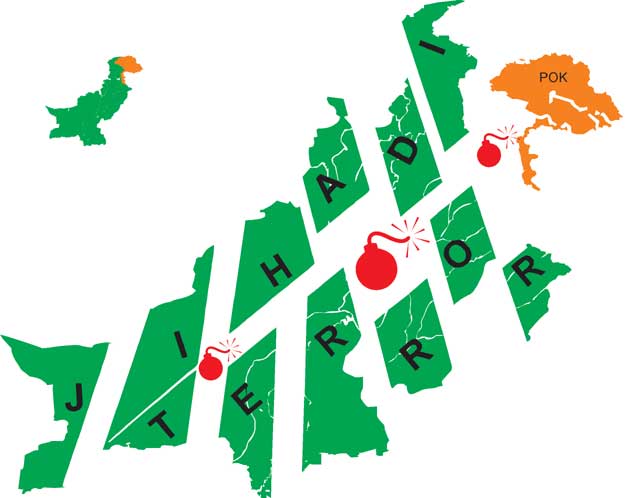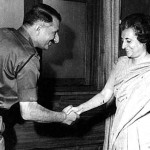IDR Blog
Leadership of Ummah: Choices for Pakistan

In an article published by Centre for Land Warfare Studies (CLAWS) in Aug 2019, I had elucidated on the (un)holy embrace of Pakistan with the Middle East[1] in a desperate attempt to seek an identity divorced from India centric South Asia and align itself to the Islamic world of West Asia and Middle East Asia. This argument had been further cemented by creation as an Islamic state and also the Islamic Bomb which provided it the much needed muscle to assert itself as the custodian of the Ummah alongside Saudi Arabia as a natural ally. In last one year lot of water has flown down the Indus and Euphrates with new geo-strategic alignments developing in a hyper realistic world order[2]. The COVID19 pandemic has dented the concept of globalisation and has nullified interdependence to a large extent, the fact remains that anarchy cannot be eclipsed and the notion that today’s friends can be tomorrow’s enemies perseveres. While alliances are usually created to serve as a deterrent against a common threat, groupings and alignments have surfaced for economic gains and to deliver political interests. Pakistan’s tight rope balancing act between Iran and Saudi Arabia has been put under duress and forced it to make choices which may dictate the future course of affairs in South Asia.
Israel’s nascent relations with the Gulf states has caught the public attention, commencing with the epochal visit in October 2019 by Prime Minister Netanyahu to Muscat[3], UAE has established ties with Israel as well as calls by Bahraini officials endorsing Israel’s acceptance and regional integration[4]. Israel along with various Gulf Arab states including Saudi Arabia believes that Iran is a disrupting force, which interferes in conflicts and supports rivals across the region through its proxies and is a common putative adversary. However, as with every relationship, Israel-Gulf relations have second order effect on Pakistan’s equation which has not yet recognised Israel and has no diplomatic ties with the Jerusalem.
Pakistan and Israel may be considered as ideological twins because both countries were born on the basis of their religions. But both never had any diplomatic relations with each other[5]. The three main reasons for not recognising Israel as a state are; one is solidarity with the Muslims of Palestine and a parallel drawn with alleged occupation of Kashmir by India. Secondly, Israel’s relation with India has completed 25 years and has been cemented with military support by Israel majorly impacting Pakistan. Finally any relations with Israel would put Pakistan in a soup domestically with the fundamentalist mullahs would go up in arms with military connivance. Imran Khan cannot rubberstamp such an idea without the theocratic approval of the military mullah nexus. While such a relationship with Israel affords Pakistan to curry favours with the US but may also trigger Iranian wrath closer home in a volatile Baluchistan and across the Durand Line where Iran-Taliban nexus[6] is starting to assert itself and chart an independent course that may discomfort Pakistan. The impending elections in USA too have a direct impact on the geo-politics of the Islamic Ummah. The chasm between Republicans and Democrats with respect to Iran has created two distinct lobbies, one that wants Iran to be under check and hence would support Trump and the others like Pakistan who have always found more traction in Washington under a Democrat President would seek a position of arbitrator with Iran as they did in Afghanistan.
Another ‘Jack in the Box’ has been Turkey which has started to assert itself and is vehemently lobbying for the leadership role in the Islamic world. The transformation of the Hagia Sophia from a museum to a mosque[7] has smashed any hope for Ankara to join the European Union and has instead pulled it towards pan-Islamism. Recep Tayyip Erdogan has championed the cause of prosecuted Muslims world over which includes spewing vitriol against India[8] which has been music to the Pakistani ears. Saudi Arabia, since the rise of crown prince Mohammed bin Salman in 2015, has significantly reduced global funding for Islamic cause, Turkey’s Directorate of Religious Affairs (Diyanet)[9] has stepped in. It is now providing services to Muslim communities, training religious personnel, publishing religious literature, translates the Qur’an into local languages and funds students from across the world to study Islam at Turkish institutions. Turkey is at loggerheads with Saudi Arabia as well as USA over the killing of journalist Jamal Khashoggi and Syria respectively. Turkish support for Qatar in its dispute with the Saudis and Emiratis; differences over Libya, Syria and the Kurds; and Ankara’s activist foreign policy is still in contrast to Saudi Arabia’s salafism. It projects itself and its religiosity as far more modern, tolerant and forward-looking. Turkey’s projection goes beyond Prince Mohammed’s attempt to shave off the raw edges of Wahabism and Erdogan attempts to present himself as a proponent of what may be termed as moderate Islam. It is also possible that Turkey has recalibrated its stance with respect to Chinese oppression of Uighurs[10] under Pakistan’s coaxing to ensure it has the heft of the Chinese Renminbi (RMB) while it stakes claim for the leadership of Islamic Ummah and tries to depose Saudi Arabia from the pedestal.
Saudi Arabia was one of the first countries to acknowledge the unique position of Pakistan in the Islamic world[11]. Saudi Arabia saw a partner in Pakistan which is militarily powerful and has no interest in meddling with the regional affairs of the Middle East and the Kingdom also had a fundamental base to accelerate the relationship because of the shared identity of a nation driven and formed by an Islamic character. However, the partnership between Saudi Arabia and Pakistan has been under duress for some time now. The first very clear indicator was the OIC’s refusal of Pakistan’s request to convene a foreign ministers’ meeting to discuss the Kashmir issue. Saudi Arabia and UAE, which once stood with Islamabad on Kashmir, UAE honoured Prime Minister Narendra Modi[12] with a prestigious award and Saudi Arabia invited him to a glittering investment forum in Riyadh. Saudi Crown Prince Mohammed bin Salman’s visit to New Delhi in February 2019 was a runaway success as the kingdom pledged huge investments across multiple sectors and signed a $15bn energy deal[13]. Pakistan was strong-armed after Foreign Minister Qureshi’s critical interview; Saudi Arabia prematurely called back a $1bn loan[14] and has not yet renewed an agreement to defer payments on $3bn of Saudi oil imports. Over the years, Pakistan has relied heavily on Saudi oil and financial largesse but this may be the beginning of the end. Pakistan’s economy has typically depended heavily on remittances from workers based in the kingdom. But the end of the global commodity boom in 2014, remittance inflow has dropped which is set to further fall this year due to Covid-19.
Pakistan has always been suspicious of Iran because of its relationship with India and presence of large Shia population with close ties with Iran’s theocracy. India’s close proximity to USA has driven a wedge between India and Iran; it has become evident as India has stopped importing oil from Iran due to US sanctions. This has given Iran more leeway when it comes to Kashmir. For years, Tehran avoided wading into the dispute. But Iran’s Ayatollah condemned India’s abrogation of Article 370 last August[15]. India’s investments in Iranian gas and infrastructure projects like Chabahar are on life support and Chinese intervention may be even at Pakistan’s behest are putting the equation further into jeopardy. China and Iran are negotiating a $400 billion military and trade agreement[16]. These two developments carry significant implications for Pakistan, a country who’s economic and security interests are closely allied with China and which sees India’s investment along its western border region as a national security threat. Moreover, Islamabad sees Beijing’s increasing foothold in Iran as crucial when it comes to containing New Delhi’s alleged interference in Baluchistan.
It is evident that two camps start to appear vying for the same demographic, political and economic space. The original leaders of Ummah under the stewardship of Saudi Arabia with Organisation of Islamic Countries (OIC) as the fountain head and the pretenders to the throne under the tutelage of Turkey being propped by Iran, Pakistan and Malaysia. In summary three points that would drive this chasm are; first are the anxieties regarding Turkey’s military presence in the north of Syria, its collaboration with Russia and Iran throughout the Astana process[17] and its role of promoting democracy so as to threaten the status quo in the Gulf. Secondly it is closely linked with the lack of capability of the OIC states to act independently in solving the crises in the region and being under the yoke of Israel and the United States. Finally, as Turkish moderate Islam becomes more attractive for the West and also Asia, it would increase Turkey’s influence among the population shaping governmental opinions. Pakistan, for its part, may gravitate increasingly towards the Turkey-Qatar-Iran-Malaysia camp spurred by Chinese. It has close and long-standing ties to Turkey, receives energy from Qatar, and could make more progress on Kashmir by forming a united front with those powers.
It may be hence important for India policy makers to monitor the trajectory of this rivalry in the Ummah as it would have a direct impact on India in times to come. Muslim countries where foreign policy is responsive to public opinion, have taken a clear stand against India. It would be safe to say that the perception of the new claimants of ‘Muslim Ummah’ with respect to India is increasingly of a country rife with anti-Muslim prejudice and violence. This image is perhaps not yet as starkly negative, but that accumulated goodwill in other parts of the Islamic world would steadily taper off in many other countries. It would not only mean the fraying of enduring relationships, but also defenestrate India’s image as a beacon of pluralism and democracy. It would invariably strengthen the kerfuffle around Kashmir much to the epicaricacy of Pakistan.
End-Notes
[1] https://www.claws.in/publication/pakistan-and-middle-east-an-unholy-embrace/ accessed on 01 Aug 20.
[2] Kanti Bajpai, Modi’s Foreign Policy – How’s It Going? From Nehruvianism to a Neoliberal and Hyper-Realist Hybrid?globalbrief.ca/2016/09/modis-foreign-policy-hows-it-going/ accessed on 17 Sep 2020.
[3] Israel’s prime minister visits Oman, an Arab monarchy—and is welcomed, “The Economist” https://www.economist.com/middle-east-and-africa/2018/11/03/israels-prime-minister-visits-oman-anarab-monarchy-and-is-welcomed accessed on 15 Aug 2020.
[4] https://www.timesofisrael.com/senior-israeli-officials-reportedly-say-bahrain-next-in-line-for-normalization / accessed on 15 Aug 2020.
[5] Mahmoona Bashir, Friends or Foes: An Analysis of Pakistan and Israel Relations, Bahria University Department of Management Sciences, https://papers.ssrn.com/sol3/papers.cfm?abstract_id=3576079 accessed on 15 Aug 2020.
[6] https://eeradicalization.com/the-iran-taliban-relationship-friends-or-foes/accessed on 16 Aug 2020.
[7] https://www.washingtonpost.com/opinions/2020/07/15/converting-hagia-sophia-into-mosque-is-an-act-cultural-cleansing/ accessed on 16 Aug 2020.
[8] https://economictimes.indiatimes.com/news/defence/recep-tayyip-erdogan-expresses-fresh-support-for-pakistans-stance-on-kashmir/articleshow/77342317.cms accessed on 16 Aug 2020.
[9] Ahmet Erdi Öztürk, Transformation of the Turkish Diyanet both at Home and Abroad: Three Stages, https://doi.org/10.4000/ejts.5944 accessed on 16 Aug 2020.
[10] https://eurasiantimes.com/erdogan-succumbs-to-chinese-pressure-starts-to-prosecute-uyghur-muslims-in-turkey-npr-reports/ accessed on 16 Aug 2020.
[11] Nadeem Ahmed Moonakal , The Contours of the Saudi Arabia-Pakistan Relationship, https://www.e-ir.info/2020/02/20/opinion-the-contours-of-the-saudi-arabia-pakistan-relationship/ accessed on 16 Aug 2020.
[12]https://www.indiatoday.in/india/story/uae-honours-pm-narendra-modi-with-highest-civilian-award-1591159-2019-08-24 accessed on 15 Aug 2020.
[13]https://www.livemint.com/news/india/what-mbs-s-visit-has-done-to-boost-saudi-india-ties-1550788567619.html accessed on 15 Aug 2020.
[14]https://economictimes.indiatimes.com/news/international/world-news/saudi-arabia-ends-a-loan-and-associated-oil-supply-to-pakistan-following-threats-to-split-oic/articleshow/77499372.cms accessed on 16 Aug 2020.
[15]https://www.asianage.com/world/middle-east/220819/supreme-leader-of-iran-expresses-concern-over-kashmir-issue.html accessed on 14 Aug 20.
[16]https://www.forbes.com/sites/arielcohen/2020/07/17/china-and-iran-approach-massive-400-billion-deal/#218f19092a16 accessed on 16 Aug 2020.
[17] Joint Statement by Iran, Russia and Turkey on the International Meeting on Syria in the Astana format, https://www.mid.ru/en/foreign_policy/news/-/asset_publisher/cKNonkJE02Bw/content/id/3949043
Courtesy: https://www.claws.in/leadership-of-ummah-choices-for-pakistan/




